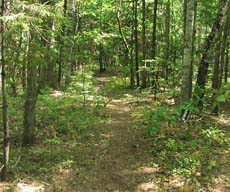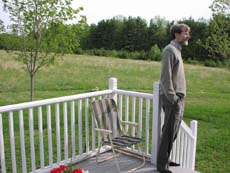A Swedish example

Paths through the landscape

Permeable walls, in a sculpture at a Swedish garden

Could the rights bundled as ownership be unbundled?
Sweden provides a strong right of access for anyone to any property in the countryside. A popular introduction to Swedish culture describes Allemänsrätten (the right of all):
As long as you do not damage growing crops or seedlings, and do not trespass in . . . the land immediately surrounding a private house, you can walk or ski on other people's land without having to seek permission from the owner of the property. If the land is fenced in you can still go across, as long as you shut the gate properly behind you and do not damage the fencing. . . . Any signs forbidding entry can only be put up with the permission of the local authority. . . . You may put up a tent and camp for a night or so . . . and you don't need to ask the landowner's permission. . . . You may pick wild berries, flowers, and mushrooms, and pick up fallen branches and dry wood. Svennson 1996, 68-70
This separation of the regulation of access from other ownership rights is almost unthinkable in the American context. It changes the ways people can recognize one another as free and equal, modifying their self-definition and their horizon of possible actions. It opens a different way of relating property and nature.
Cohousing is another north European practice that could redefine community identities. Joint living arrangements exist in many varieties, involving some shared property, and many shared meals, activities, child care, and maintenance. Cohousing attempts in the US often run into zoning barriers, which shows the importance of challenging the dominance of the single family, single ownership model.
This is not meant to suggest that Americans should unthinkingly adopt European practices, but to point out that existing combinations of rights and privileges may not be as "natural" as they are taken to be. New distributions of responsibilities and rights could change the way suburban dwellers relate to places, allowing more kinds of acknowledged subject positions and more complex inhabitation.